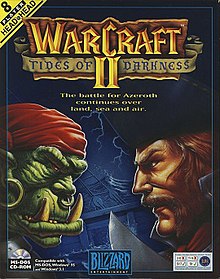Warcraft 2
| Warcraft II: Tides of Darkness | |
|---|---|
 |
|
| Developer(s) | Blizzard Entertainment |
| Publisher(s) | Blizzard Entertainment |
| Producer(s) | Sam Didier Michael Morhaime Patrick Wyatt |
| Designer(s) | Ron Millar |
| Programmer(s) | Bob Fitch Jesse McReynolds Michael Morhaime |
| Writer(s) | Chris Metzen |
| Composer(s) | Glenn Stafford |
| Series | Warcraft |
| Platform(s) | DOS, Mac OS, Saturn, PlayStation, Microsoft Windows |
| Release |
PC, Mac OS Saturn, PlayStation |
| Genre(s) | Real-time strategy |
| Mode(s) | Single-player, multiplayer |
| Aggregate score | |
|---|---|
| Aggregator | Score |
| GameRankings | 95% |
| Review scores | |
| Publication | Score |
| CGW | |
| Game Revolution | 91% |
| GameSpot | 93% |
| The Adrenaline Vault | 91 |
| Computer Games Magazine | |
| Entertainment Weekly | A |
| Next Generation |
|
| Macworld | |
| MacUser | |
Warcraft II: Tides of Darkness is a fantasy-themed real-time strategy (RTS) game published by Blizzard Entertainment and released for DOS in 1995 and for Mac OS in 1996. It was met with positive reviews and won most of the major PC gaming awards in 1996. It sold over 2 million copies.
In 1996, Blizzard released an expansion pack Warcraft II: Beyond the Dark Portal for DOS and Mac OS, and a compilation Warcraft II: The Dark Saga for the PlayStation and Sega Saturn. The Battle.net Edition, released in 1999, provided Blizzard's online gaming service, Battle.net, and replaced the MS-DOS version with a Windows one.
Players collect resources, and produce buildings and units in order to defeat an opponent in combat. Players gain access to more advanced units upon construction of tech buildings and research. The majority of the main screen shows the part of the territory on which the player is currently operating, and the minimap can select another location to appear in the larger display. The fog of war completely hides all territory which the player has not explored. Terrain is always visible once revealed, but enemy units remain visible only so long as they stay within a friendly unit's visual radius.
Warcraft II's predecessor Warcraft: Orcs & Humans, released in 1994, gained good reviews, collected three awards and was a finalist for three others, and achieved solid commercial success. The game was the first typical RTS to be presented in a medieval setting and, by bringing multiplayer facilities to a wider audience, made this mode essential for future RTS titles. Warcraft: Orcs & Humans laid the ground for Blizzard's style of RTS, which emphasized personality and storyline. Although Blizzard's successful StarCraft, released in 1998, was set in a different universe, it was similar to Warcraft II in gameplay and in attention to personality and storyline. In 1996 Blizzard announced Warcraft Adventures: Lord of the Clans, an adventure game in the Warcraft universe, but canceled the game in 1998. Warcraft III: Reign of Chaos, released in 2002, used parts of Warcraft Adventures characters and storyline and extended the gameplay used in Warcraft II.
...
Wikipedia
